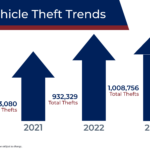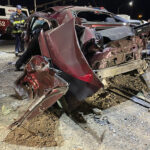Commissioner of Insurance Jim Donelon says Louisiana’s program to reduce vehicle theft and insurance fraud will be expanded in Orleans Parish, which includes New Orleans.
Donelon made the announcement about the expansion of the Louisiana Automobile Theft and Insurance Fraud Prevention Authority (LATIFPA) at press conference where he was joined by by New Orleans Police Department (NOPD) Assistant Superintendent Marlon Defillo and National Insurance Crime Bureau (NICB) President and CEO Joe Wehrle.
Donelon said that in partnership with the NICB and the NOPD, LATIFPA is expanding its Vehicle Investigation Prevention Enforcement Response (VIPER) and its License Plate Recognition (LPR) programs.
VIPER is a statewide bait car program whereby LATIFPA, in conjunction with the NICB, equips vehicles donated by insurance companies with the latest digital, video and audio recording devices, GPS tracking, remote door locking and engine shutoff capabilities. Upon activation of the system, law enforcement makes arrests as appropriate. Donelon said the target goal of the VIPER program is to have multiple bait vehicles in every major city in Louisiana where you have incidences of increased vehicle theft.
“New Orleans received its first bait car in September so it’s only been active for about a month,” said Donelon. The VIPER program was delayed in New Orleans due to the aftermath of Hurricane Katrina.
While there have been no activations or arrests associated with the new bait vehicle in the city of New Orleans, LATIFPA has placed four other bait vehicles in Baton Rouge (two vehicles); Shreveport (1) and Lake Charles (1). These four bait cars combined have resulted in 75 activations and 99 arrests.
Donelon also announced that the LATIFPA board of directors recently approved the awarding of a second License Plate Reader (LPR) to New Orleans. The LPR program is funded by LATIFPA and implemented in conjunction with the NICB. The LPR systems are designed to capture pictures of thousands of license plates from moving or stationary vehicles, process the images and send the images to a centralized database, and within seconds determine if the vehicle matching the license plate has been reported stolen.
“This technology has also been used by law enforcement to track Amber Alerts, car jackings, and robberies with vehicle descriptions,” Donelon added. Under the LATIFPA License Plate Recognition program, LPR systems will also be operational in Baton Rouge, Lafayette and in Tangipahoa Parish.
The first LPR received by the NOPD in January 2009 has so far aided in the recovery of 16 stolen vehicles valued at approximately $191,000 and one stolen license plate has been recovered.
All of the LPRs in Louisiana combined have aided in the recovery of 91 stolen vehicles valued at approximately $914,000, 24 stolen license plates and 40 arrests through September 2009.
Donelon said that according to the FBI, there were nearly 1 million motor vehicle thefts in the United States in 2008 with an estimated value of $6.4 billion. In Louisiana, there were nearly 14,000 vehicles reported stolen in 2008, ranking Louisiana 21st in the nation in the actual number of vehicles stolen.
Also in 2008, the FBI reported that New Orleans was ranked highest in Louisiana for motor vehicle theft offenses known to law enforcement, with 3,208 motor vehicle thefts. Shreveport/Bossier City is second with 1,253 reported motor vehicle thefts. Baton Rouge was next, reporting 974 motor vehicle thefts that same year.
Insurance fraud accounts for 10 percent of the property and casualty insurance industry’s losses and those losses are passes on to you by way of higher premiums, Donelon said. He added that the average household pays over $950 a year in additional premiums to cover insurance fraud.
LATIFPA was created by the Louisiana Legislature in 2004 and is a public agency whose purpose is to combat motor vehicle theft, including fraud by theft and other criminal acts. LATIFPA may solicit and accept gifts, grants, donations, loans and other assistance from any public or private entity or person for the implementation of its programs.
Source: Louisiana Department of Insurance
Was this article valuable?
Here are more articles you may enjoy.

 Viewpoint: Striking Risk-Reward Balance for Shipping Lithium-Ion Batteries
Viewpoint: Striking Risk-Reward Balance for Shipping Lithium-Ion Batteries  Dog-Related Injury Claim Payouts Hit $1.12B in 2023, Report Shows
Dog-Related Injury Claim Payouts Hit $1.12B in 2023, Report Shows  National Crime Report Shows Vehicle Thefts Surged to More than 1 Million in 2023
National Crime Report Shows Vehicle Thefts Surged to More than 1 Million in 2023  Report: Vehicle Complexity, Labor ‘Reshaping’ Auto Insurance and Collision Repair
Report: Vehicle Complexity, Labor ‘Reshaping’ Auto Insurance and Collision Repair 